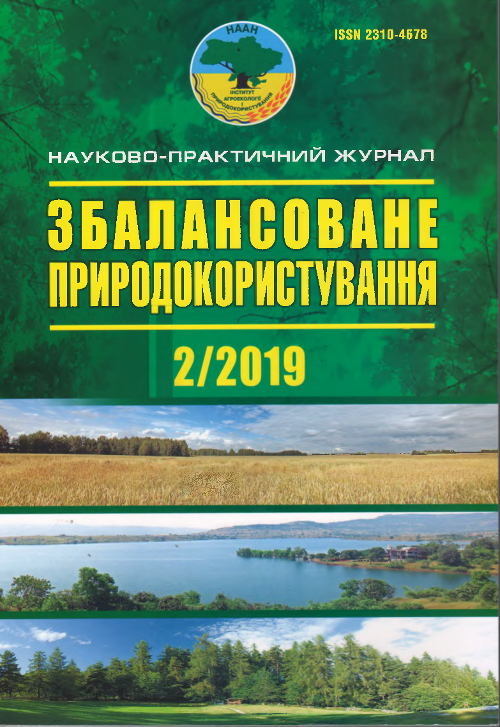Формування моделі збалансованого розвитку рекреаційних територій
DOI:
https://doi.org/10.33730/2310-4678.2.2019.184164Keywords:
збалансований розвиток, рекреаційні території, модель, атрактор, потенціалAbstract
Обґрунтовано, що збалансований розвиток рекреаційних територій ґрунтується на досягненні рівноважного стану в процесі реалізації екологічних, економічних та соціально-культурних цілей розвитку територій. Тому за цими напрямами систематизовано основні концептуальні принципи та завдання щодо забезпечення збалансованого розвитку рекреаційних територій. Для оцінювання розвитку рекреаційних території відповідно до принципів еколого-збалансованого розвитку запропоновано систему індикаторів. Визначено, що процес стимулювання збалансованого розвитку рекреаційних територій доцільно розглядати через призму теорії мотивації. Багатогранність та різноманіття мотивацій, які спонукають людину до вибору того чи іншого місця та способу відпочинку, обумовлюють необхідність виявлення атракторів, що підвищують привабливість територій і потребують стимулюючого підходу з боку органів управління. На основі цих заходів системою збалансованого розвитку рекреаційних територій можливо досягнення стану збалансованості, стабільності, конкурентоспроможності, безпеки та мотивації для активізації внутрішніх потенційних можливостей. Кінцевою метою збалансовано розвитку рекреаційних територій є задоволення потреб рекреаційних територій (соціальних, екологічних, економічних) через активну діяльність територіальних суб’єктів під впливом стимулюючих інструментів. Механізм стимулювання збалансованого розвитку рекреаційних територій передбачає систему державних та ринкових інструментів і важелів.
На засадах концептуального підходу розроблено теоретико-методологічний підхід до формування моделі збалансованого розвитку рекреаційних територій, складовим елементом якого є методологічний підхід до групування регіонів за рівнем ресурсного потенціалу, що є основою для розробки сценаріїв розвитку рекреаційних територій, та обґрунтування стратегій збалансування їх розвитку за кожним із визначених сценаріїв. Реалізація стратегій збалансування здійснюється через науково обґрунтований еколого-економічний механізм та відповідний інструментарій.
References
Koieva, Zh.V. (2011). Vykorystannia teorii system i systemnoho analizu v upravlinni intehrovanymy strukturamy v ekonomitsi [The use of systems theory and systems analysis in the management of integrated structures in the economy]. Ekonomika kharchovoi promyslovosti [Economics of Food Industry], 4. 55–58. (In Ukr.)
Bukreev, I.A. (2013). Role of the recreational potential of the region in the competitiveness of the recreational and tourist industry. Economic analysis. 14 (1). 31–37.
Buckley, R. (2011). Tourism and Environment. Annual Review of Environment and Resources. 36. 397–416.
Cherchyk, L. & Mostenets, O. (2016). Mekhanizm zabezpechennia konkurentospromozhnosti rekreatsiinoi systemy rehionu [Mechanism of ensuring the competitiveness of the recreational system of the region]. Lutsk: Vezha-Druk. 215. (In Ukr.)
Horlachuk, V.V. & Haidaienko, O.M. (2007). Teoretyko-metodolohichni zasady upravlinnia ratsionalnym vykorystanniam rekreatsiinykh terytorii [Theoretical and methodological principles of management of the rational use of recreational territories]. Naukovi Pratsi MDHU Im. P. Mohyly [Scientific works of Petro Mohyla MSU], 72 (59). 7–15. (In Ukr.)
Kotler, Ph.T., Bowen, J.T., Makens, J. and Baloglu, S. (2017). Marketing for Hospitality and Tourism (7th Edition). Boston: Pearson, 658.
Cooper, C.P., Fletcher, J., Gilbert, D. and Wanhill, S. (1993). Tourism: Principles and Practice. London: Pitman, 355.
Mokryi, V.I. (2008). Informatsiini tekhnolohii zbalansovanoho rozvytku rekreatsiinykh kompleksiv Shatskoho NPP [Information technologies of balanced development of recreational complexes of Shatsky National Park]. Ekolohichnyi Visnyk [Ecological Bulletin], 6. 20–21. (In Ukr.)
Bublik, B.N. & Kirichenko, N.F. (1975). Osnovy teorii upravleniya [Fundamentals of control theory]. Kyiv: Visha shkola. 328. (In Russ.)
Ponomarenko, L.A. (2002). Osnovy ekonomichnoi kibernetyky: pidruchnyk [Fundamentals of economic cybernetics: textbook]. Kyiv: KNTEU. 432. (In Ukr.)
Oborin, M.S. (2015). Funkcionirovanie i dalnejshee razvitie regionalnyh kurortno-rekreacionnyh zon [The functioning and further development of regional resort and recreation zones]. Perm: Izd-vo «OT I DO». 236. (In Russ.)
Sviridova, N.D. (2005). Razvitie turizma v regione kak obekt gosudarstvennogo upravleniya [Tourism development in the region as an object of public administration]. Aktualni problemi ekonomiki [Actual problems of economy], 2 (44). 18–21. (In Russ.)
Downloads
Issue
Section
License
- The authors reserve the right to authorship their work and pass the journal the right to publish this work under a Creative Commons Attribution License license, which allows other persons to freely distribute the published work with the obligatory The authors of the original work and the first publication of this magazine.
- The authors have the right to make independent additional agreements on the nonexclusive dissemination of the work in the form in which it was published by this magazine (for example, to post work in the company's electronic storage or to publish as a monograph) , subject to the first publication of the link to this journal.
- Journal policy allows and encourages the placement of authors on the Internet (for example, in the repositories of institutions or on personal websites) manuscript work as to the presentation of this manuscript to the editorial board and during its editorial processing, as it contributes to The productive scientific discussion and positively affects the efficiency and dynamics of citation published work (see The Effect of Open Access).


